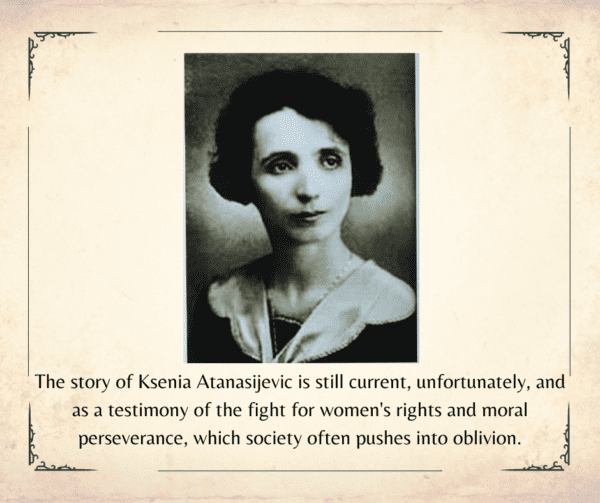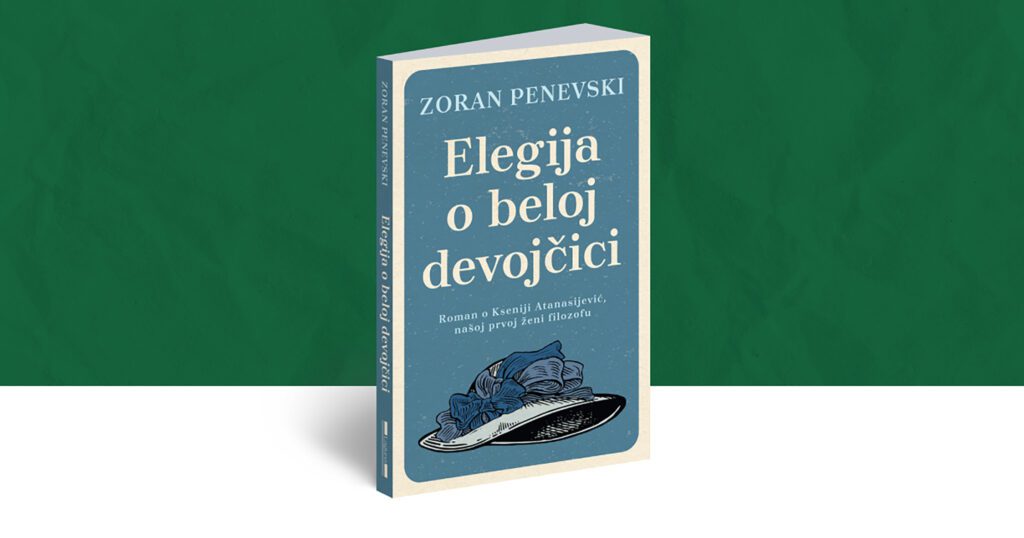Interview with Zoran Penevski
“Elegy on the White Girl” is a story about the fate of an intellectual in Serbia.

Ksenija Atanasijević (1894–1981) was the first female doctor of science and the first female assistant professor in the Kingdom of Serbs, Croats, and Slovenes. Zoran Penevski’s “Elegy on the White Girl” is a novel about her life that is inventively woven around her first published story of the same name and is in the form of fragments based on her most famous work “Philosophical Fragments”.
In the interview for YU Biblioteka, writer Zoran Penevski is talking about his novel. He explains how he got the idea to write about one significant woman from Serbian history, a woman that we still do not know and appreciate enough.
How did you come up with the idea to write a novel about Ksenia Atanasijević? What was particularly interesting and inspiring about her biography?
For me, her life is a story about the fate of an intellectual in our midst because, by an intellectual, I mean a thinking being who does not belong to any ideological circle, nor to a palanquin, nor to a clear-national milieu, but is a person who defines himself by his ethical essence. The story of Ksenia Atanasijević is still current, unfortunately, and as a testimony of the fight for women’s rights and moral perseverance, which society often pushes into oblivion. It was no less critical for me to point out that actual creators can see their destiny in their work.
How did you decide to write a novel in the form of fragments based on her work “Philosophical Fragments”?
For a long time, I searched for a way to write a novel about Ksenia, without it being a simple “romanced biography”. On the other hand, the problem is how to reveal the life thread of a woman who was very active and who published a lot, and I felt the need to present her fate as a unique whole. The fragments then imposed themselves as a solution that was close to her thinking in terms of form, and they were challenging enough for me to drown my voice in them.

Why is the novel called “Elegy on the White Girl”?
The frame of the novel is probably her first published story “Elegy on the White Girl”, and passages of that text have been used as titles of separate units, one might say chapters. In addition, Ksenija was dedicated to moral purity, and through her life and work, that surreal whiteness, the brightness in which she wanted to exist, shines through.
What historical figures are mentioned in the novel? What was the social climate in Serbia a century ago?
There are many characters who are functionally included in the novel: from Rastko and Nadežda Petrović from childhood, through Branislav Petronijević and Geca Kon, to Dušan Nedeljković and Sima Pandurović or Aleksandar Ranković. A century ago, Belgrade was becoming a true urban center, but women were still looked down upon, even by prominent scientists and professors.
What is the importance of Ksenija Atanasijević as the first female doctor of philosophy in Serbia? To what extent was she ahead of her time?
I would say that Ksenia, as the first philosopher – by that I mean her professional and genuine knowledge, writing and translation – conquered that area of social consciousness that was considered inaccessible to women. What makes her a woman ahead of her time is her moral steadfastness and her non-adherence to ideological views, which led her to be arrested by both the Nazis and the Communists.
You stated that it was important for you to emphasize that true creators can see their destiny in their work. How is her fate reflected in the work of Ksenija Atanasjević?
Already in her first story, one can see her life’s journey: a lament about a martyred innocent girl. Her Philosophical Fragments and other writings, for example, Characters of Intrigue, are the essence of her experience, a synthesis of philosophical, ethical, and psychological reflection. Her whole life was a search for whiteness.

How much sacrifice and suffering was there in her life? How much did her personal life suffer because of her intellectual work and the struggle to persevere in it?
Very much and constantly. Being a good pianist, she often told herself that it would be easier for her to choose music rather than philosophy.
Her success was tarnished by rumors that her relationship with Professor Petronijević was responsible for it, so she had to take care of her private life. Petty talk cost her dearly. She met her partner quite late, and she managed to overcome all difficulties in many ways thanks to the help of friends, known and unknown.
To what extent did Ksenija Atanasijević pave the way for other women from the world of science and art in Serbia and influence them?
Her contribution to this is excellent, but her removal from public life after World War II had consequences. Even today, her diaries have yet to be published and arranged, and her main works have no newer editions. In a strange way, Ksenia is relatively present and well-known but practically still neglected.
What are you doing now? What do you have planned?
I’m working on a children’s story called Vertigo Days in the Blue Forest.
Jelena Jovanović

Info
Zoran Penevski Zoran Penevski (Pančevo, 1967) is a Serbian novelist and graphic novel writer, screenwriter, and translator. He wrote novels Less important crimes (2005) – scholarship of the “Borislav Pekić” Fund, Traces of Absence (2008), Midnight on Your Arms (2012), Lecturer (2015).
Zoran also wrote graphic novels, and children books: Budimir and rare species (2013), Sara and the Forgotten Square (2015), Sarah and January for Two Girls (2018). He also wrote collections of short stories The Flemish Sleepwalker (1997), Stomach History (1999) – stories about Gogolj.
Also, he translated more than fifty books (from English, German and Macedonian), and edited more than one hundred editions. His works have been translated into English, French, Dutch and Macedonian.
Photo Credit: Goran Nikolić
